Education Sponsorship Letter
[Your Name]
[Your Address]
[City, State, ZIP Code]
[Email Address]
[Phone Number]
[Date]
[Recipient's Name]
[Recipient's Title]
[Organization Name]
[Organization Address]
[City, State, ZIP Code]
Subject: Request for Education Sponsorship
Dear [Recipient's Name],
I hope this letter finds you well. I am writing to express my sincere interest in seeking education sponsorship from [Organization Name]. I am a dedicated and motivated individual with a strong passion for education and a desire to excel in my chosen field of study.
Currently, I am pursuing a degree in [Your Field of Study] at [Your University/College Name]. As you may be aware, pursuing higher education comes with financial challenges, including tuition fees, books, and living expenses. Despite my best efforts to secure part-time employment and explore various scholarships, I find myself in need of additional support to ensure the successful completion of my education.
I believe that [Organization Name] shares a commitment to empowering individuals and contributing to the development of skilled professionals in various fields. Your organization's mission and values align with my own aspirations, making it a perfect fit for potential sponsorship. By offering your support, you would not only be investing in my personal and academic growth but also in the advancement of knowledge and expertise in [Your Field of Study].
In return for your generous sponsorship, I am committed to representing [Organization Name] with the utmost integrity and dedication. I am open to opportunities for engagement, such as participating in events, seminars, or projects that align with my field of study and your organization's objectives.
Enclosed with this letter, please find copies of my academic transcripts, a detailed breakdown of my educational expenses, and any other required documentation. I would be honored to discuss further details and explore the possibility of collaboration at your convenience. I am available for a meeting or interview at a time that suits you best.
I am deeply grateful for your consideration of my request for education sponsorship. Your support would not only alleviate my financial burden but also inspire me to work harder and strive for excellence in my studies. Thank you for taking the time to review my application.
Please feel free to contact me via email at [Your Email Address] or by phone at [Your Phone Number] to arrange a suitable time for a discussion. I look forward to the opportunity to speak with you and explore the potential partnership between [Organization Name] and myself.
Once again, thank you for your time and consideration.
Sincerely,
[Your Full Name]
[Your Student ID (if applicable)]
Letter from Parent/Guardian Requesting Education Sponsorship for Child
Dear [Sponsor Name/Organization],
I am writing to respectfully request financial sponsorship for my [son/daughter], [Child's Full Name], who is currently [age] years old and eager to pursue [his/her] education at [School/Institution Name].
Despite our family's strong commitment to education, we are facing significant financial constraints that make it challenging to afford the tuition fees and related educational expenses. [Child's Name] has consistently demonstrated exceptional academic performance, maintaining a [GPA/grade average] and showing particular aptitude in [subjects/areas]. [He/She] dreams of becoming a [future career aspiration] and is deeply motivated to excel in [his/her] studies.
The total cost of [his/her] education for the [academic year/semester] is approximately [amount], which includes tuition, books, uniforms, and transportation. Our family's monthly income of [amount] barely covers our basic living expenses, leaving us unable to meet these educational costs without assistance.
I have attached [Child's Name]'s academic transcripts, a recommendation letter from [his/her] current teacher, and our family's financial documentation for your review. Any support you could provide would not only change my child's life but would also invest in a promising young person who is committed to making a positive difference in our community.
I would be grateful for the opportunity to discuss this request further at your convenience. Thank you for considering our application and for your dedication to supporting education.
Respectfully yours,
[Your Full Name]
[Your Contact Information]
[Date]
Formal Letter from Educational Institution Seeking Corporate Sponsorship
Dear [Company Name] Leadership,
Subject: Partnership Opportunity for Educational Sponsorship Program
On behalf of [Institution Name], I am writing to propose a mutually beneficial partnership through our Educational Sponsorship Program. Our institution has been serving the community for [number] years, providing quality education to over [number] students annually, many of whom come from economically disadvantaged backgrounds.
We are seeking corporate partners who share our vision of making education accessible to all deserving students regardless of their financial circumstances. Currently, we have identified [number] exceptional students who possess outstanding academic potential but lack the financial resources to continue their education. These students have maintained excellent academic records with an average GPA of [number] and have demonstrated leadership qualities through their involvement in [activities/programs].
Your sponsorship would directly fund tuition, educational materials, technology resources, and mentorship programs. We offer various sponsorship levels:
- Full Scholarship Sponsorship: [amount] per student annually
- Partial Scholarship Sponsorship: [amount] per student annually
- Program Sponsorship: [amount] for specific educational initiatives
In return, we offer prominent recognition in our publications, website, and events, opportunities for employee volunteer engagement, and regular impact reports demonstrating how your investment is transforming lives. Your organization would also receive tax benefits as outlined in [relevant tax code].
We have enclosed our institution's annual report, financial statements, student success stories, and a detailed proposal outlining the sponsorship benefits. I would welcome the opportunity to meet with you to discuss how we can create a partnership that aligns with your corporate social responsibility goals while making a lasting impact on our students' futures.
Thank you for considering this opportunity to invest in the next generation of leaders.
Sincerely,
[Your Name]
[Title]
[Institution Name]
[Contact Information]
[Date]
Heartfelt Email from Student Seeking Personal Sponsorship
Subject: A Request from an Aspiring Student
Dear [Sponsor Name],
I hope this message finds you well. My name is [Your Name], and I am reaching out to you with hope and humility to request your support in pursuing my educational dreams.
I am a [year] student at [School/University Name], majoring in [field of study]. Education has always been my pathway out of poverty and my means to create a better future for myself and my family. However, due to [brief explanation of circumstances - e.g., "the recent loss of my father who was the sole breadwinner," "unexpected medical expenses," "economic hardship"], I am at risk of having to discontinue my studies.
Throughout my academic journey, I have maintained a [GPA] while working part-time to contribute to my education costs. I am passionate about [field/subject] and have been actively involved in [clubs, volunteer work, projects]. My professors have encouraged me to continue, with [Professor Name] describing me as [quote or paraphrase positive feedback].
I am not asking for a handout but rather an investment in someone who is committed to making the most of every opportunity. The sponsorship I am seeking would cover [specific amount] for [tuition/books/housing] for the [upcoming semester/year]. I promise to honor your generosity by excelling academically and giving back to others in the future.
I have attached my academic transcripts, a personal statement, and letters of recommendation. I would be honored to meet with you to discuss my goals and how I plan to make a positive impact in my field.
Thank you for taking the time to read my story. Regardless of your decision, I am grateful for your consideration.
With sincere appreciation,
[Your Full Name]
[Contact Information]
[Date]
Professional Letter from Nonprofit Organization to Potential Donor
Dear [Donor Name],
Subject: Invitation to Support Our Education Sponsorship Initiative
I am writing on behalf of [Organization Name], a registered nonprofit organization dedicated to providing educational opportunities to underprivileged children in [location/region]. We have identified you as someone who shares our commitment to education and social empowerment.
Our Education Sponsorship Program has successfully supported [number] students over the past [number] years, with a [percentage]% graduation rate and [percentage]% of our sponsored students going on to higher education or meaningful employment. Each student we support represents not just an individual success story, but a ripple effect of positive change within their families and communities.
We are currently seeking sponsors for [number] students for the upcoming academic year. A sponsorship of [amount] covers one student's full educational expenses including tuition, books, uniforms, meals, and tutorial support. Alternatively, partial sponsorships starting at [amount] allow multiple donors to support a single student.
As a sponsor, you would receive:
- Quarterly progress reports and grade updates
- Personal letters and artwork from your sponsored student
- Annual impact reports showing the program's overall success
- Opportunities to meet your sponsored student (optional)
- Tax-deductible receipt for your records
Your contribution would be managed transparently, with [percentage]% going directly to student support and only [percentage]% allocated to administrative costs. We maintain strict financial accountability and are audited annually by [auditing firm name].
I have enclosed our program brochure, financial statements, and testimonials from current sponsors and students. I would be delighted to arrange a visit to our facilities or schedule a call to answer any questions you may have.
Thank you for considering this opportunity to transform a young person's life through education.
Warm regards,
[Your Name]
[Title]
[Organization Name]
[Contact Information]
[Date]
Quick Email from Employee to Employer Requesting Educational Sponsorship
Subject: Request for Professional Development Sponsorship
Dear [Manager/HR Manager Name],
I am writing to formally request sponsorship for [course/degree/certification program] that would enhance my skills and contribute to my effectiveness in my current role as [position].
The program I wish to pursue is [Program Name] at [Institution], which focuses on [relevant skills/knowledge]. This [duration]-long program will provide me with advanced knowledge in [specific areas] that directly align with our department's objectives, particularly [specific projects/goals].
The total cost is [amount], covering tuition and materials. I am requesting [full/partial] sponsorship and am committed to:
- Maintaining my current work responsibilities
- Achieving a minimum grade of [grade]
- Completing the program within [timeframe]
- Remaining with the company for [time period] after completion
- Sharing knowledge gained with my team
This investment would benefit the organization by [specific benefits - improved efficiency, new capabilities, enhanced project outcomes]. I have attached the program details, course outline, and schedule showing how I will balance work and study commitments.
I would appreciate the opportunity to discuss this request with you at your earliest convenience. Thank you for considering my professional development.
Best regards,
[Your Name]
[Employee ID]
[Department]
[Date]
Formal Letter from Government Official Recommending Student for Sponsorship
Dear [Sponsor/Organization Name],
Subject: Official Recommendation for Education Sponsorship
I am writing in my capacity as [Official Title] of [Department/Ministry] to formally recommend [Student Name] for your education sponsorship program.
I have had the privilege of knowing [Student Name] through [connection/program], and I can confidently attest to [his/her] exceptional character, academic abilities, and potential for future leadership. [He/She] has consistently demonstrated commitment to excellence, achieving [specific accomplishments] while facing significant economic challenges.
[Student Name] represents the kind of promising youth our nation needs to invest in. [His/Her] field of study, [subject area], is critical to our country's development goals in [relevant sector]. Despite scoring in the top [percentage]% of students nationally, [he/she] lacks the financial means to access quality higher education.
Our office has verified [Student Name]'s financial need through comprehensive assessment, and I can confirm that [his/her] family's annual income of [amount] falls well below the poverty line for our region. Without external support, this talented individual's potential will remain unrealized.
I strongly endorse [Student Name]'s application for sponsorship and believe that investing in [his/her] education would yield significant returns not only for [him/her] personally but for our community and nation as a whole. Should you require any additional information or verification, please do not hesitate to contact my office.
Thank you for your consideration and for your commitment to educational advancement.
Respectfully,
[Official Name]
[Official Title]
[Office/Ministry]
[Official Contact Information]
[Official Seal/Letterhead]
[Date]
Casual Email from Alumni to University Foundation Suggesting Sponsorship Program
Subject: Idea for Alumni-Funded Sponsorship Initiative
Hi [Foundation Director Name],
I hope you're doing well! As a proud [University Name] alumnus (Class of [Year]), I've been thinking about ways to give back to the institution that shaped my career and life.
I'd like to propose establishing a sponsorship fund specifically for students from [specific demographic/region/background]. Having been a scholarship recipient myself, I understand firsthand how financial support can be transformative. I'm now in a position where I can help others have the same opportunities I had.
Here's what I'm envisioning:
- An initial contribution of [amount] to sponsor [number] students
- Annual renewals based on student performance
- Possibility of expanding if other alumni want to join
- Perhaps a mentorship component where sponsored students can connect with alumni sponsors
I'd love to chat about the logistics—how the foundation typically manages these arrangements, tax implications, selection criteria, and reporting. I'm flexible on the details but passionate about making this happen.
Could we schedule a call or coffee meeting sometime next week? I'm excited to explore how we can make a real difference for deserving students who might otherwise miss out on the [University Name] experience.
Looking forward to hearing from you!
Cheers,
[Your Name]
[Contact Information]
[Date]
Preliminary Letter from Student Thanking Sponsor and Requesting Continued Support
Dear [Sponsor Name],
I hope this letter finds you in good health and spirits. I am writing to express my deepest gratitude for your generous sponsorship during my [previous year/semester] and to respectfully request your continued support for the upcoming [academic period].
Your sponsorship has been nothing short of life-changing. Thanks to your support, I successfully completed [specific achievements—courses, projects, grades] and was able to focus on my studies without the constant stress of financial uncertainty. I particularly want to share that I [specific accomplishment—made dean's list, won an award, completed an important project, etc.], which would not have been possible without your investment in my education.
As I prepare to enter my [next year/semester], I am facing educational costs of approximately [amount] for tuition, books, and necessary supplies. I am doing everything I can to minimize expenses, including [working part-time, applying for additional aid, seeking used textbooks], but I still need [amount] in sponsorship to continue my studies.
My academic goals for the coming period include [specific goals], and I am committed to maintaining the high standards you've come to expect from me. I have attached my recent transcripts, a detailed budget, and a letter from my academic advisor discussing my progress and potential.
I understand that continued sponsorship depends on various factors, and I want you to know that whatever you decide, I will always be grateful for the support you've already provided. However, I sincerely hope we can continue this journey together.
Thank you for believing in me and investing in my future. I look forward to making you proud.
With profound gratitude,
[Your Name]
[Contact Information]
[Date]
What is an Education Sponsorship Letter and Why Do You Need One
An education sponsorship letter is a formal or semi-formal written request seeking financial support for educational expenses. The primary purpose is to secure funding from individuals, organizations, corporations, or government entities to cover costs such as tuition, books, supplies, accommodation, and other education-related expenses.
These letters serve as persuasive documents that:
- Present a compelling case for why sponsorship is needed
- Demonstrate the recipient's worthiness and potential
- Outline specific financial requirements and how funds will be used
- Establish credibility and transparency
- Create a connection between the sponsor's values and the educational opportunity
- Provide necessary documentation to support the request
Who Should Write and Send Education Sponsorship Letters
- Students seeking financial aid for their own education at any level (primary, secondary, undergraduate, graduate)
- Parents or guardians requesting sponsorship on behalf of their children or dependents
- Educational institutions (schools, colleges, universities) seeking corporate or individual sponsors for student programs
- Nonprofit organizations running educational initiatives and seeking donors
- Community leaders or government officials advocating for students in their constituency
- Teachers or mentors recommending deserving students to potential sponsors
- Employees requesting professional development funding from employers
- Alumni proposing sponsorship programs to their alma mater
- Religious or community organizations supporting members' educational needs
When Should You Send an Education Sponsorship Letter
- Before the academic year or semester begins (typically 3-6 months in advance)
- When facing unexpected financial hardship that threatens educational continuity
- After receiving admission to an educational institution but lacking funding
- When applying for scholarships with specific application deadlines
- During annual corporate giving campaigns when companies allocate CSR budgets
- After demonstrating academic achievement that warrants continued investment
- When an existing sponsorship is ending and renewal is needed
- Following recommendation from a teacher or mentor who has connected you with potential sponsors
- During organizational fundraising seasons for nonprofits
- When seeking professional development opportunities that benefit both employee and employer
Requirements and Prerequisites Before Writing the Letter
- Academic records: Transcripts, report cards, certificates, test scores
- Financial documentation: Income statements, tax returns, bank statements proving need
- Recommendation letters: From teachers, employers, community leaders, or mentors
- Personal statement or essay: Explaining goals, motivation, and circumstances
- Budget breakdown: Detailed list of educational expenses requiring sponsorship
- Proof of admission or enrollment: Acceptance letter or enrollment confirmation
- Identification documents: Birth certificate, student ID, passport copies
- Sponsor research: Understanding the sponsor's mission, values, and giving priorities
- Previous academic achievements: Awards, honors, certificates, portfolios
- Character references: Letters attesting to integrity and reliability
- Clear educational goals: Defined career path or academic objectives
- Legal documentation: For nonprofits, tax-exempt status; for institutions, accreditation proof
How to Write and Send an Education Sponsorship Letter
- Research potential sponsors thoroughly to understand their priorities, previous giving patterns, and application requirements
- Gather all supporting documents before beginning to write the letter
- Choose the appropriate tone based on the relationship with the sponsor (formal for corporations/strangers, personal for known individuals)
- Open with a clear purpose statement explaining why you're writing
- Tell your story authentically including challenges, achievements, and aspirations
- Provide specific financial details with transparent breakdown of costs
- Demonstrate worthiness through academic records, recommendations, and accomplishments
- Explain the impact of the sponsorship on your life and future goals
- Make a specific ask stating exactly what amount or type of support you need
- Include all attachments mentioned in the letter
- Proofread meticulously for grammar, spelling, and factual accuracy
- Choose delivery method (email for quick response, mail for formal approach)
- Follow submission guidelines if applying to formal programs
- Send during business hours on weekdays for better visibility
- Keep copies of all correspondence for your records
Elements and Structure That Must Be Included
- Proper greeting: Address the recipient by name and title when possible
- Subject line (for emails): Clear, concise indication of purpose
- Introduction: Who you are and why you're writing
- Background information: Educational history, current situation, future goals
- Financial need explanation: Honest, specific description of circumstances
- Amount requested: Exact figures or range with justification
- Academic qualifications: Evidence of capability and past performance
- Personal qualities: Character traits, work ethic, determination
- Impact statement: How sponsorship will change your trajectory
- Sponsor benefits: What the sponsor gains (tax benefits, recognition, impact reports)
- Timeline: When funds are needed and program duration
- Attachments list: Enumeration of enclosed supporting documents
- Call to action: Invitation to discuss further or next steps
- Gratitude expression: Sincere thanks for consideration
- Professional closing: Appropriate sign-off with full contact information
- Date and signature: Hand-signed for mailed letters
Formatting Guidelines for Education Sponsorship Letters
- Length: 1-2 pages for individual requests; 2-4 pages for institutional proposals
- Tone: Professional yet personal for individual requests; strictly formal for corporate/institutional
- Font and spacing: Times New Roman or Arial, 12pt, single or 1.5 spacing
- Letterhead: Use institutional letterhead when applicable
- Format: Block format for formal letters; standard email format for electronic communication
- Language: Clear, concise, free of jargon; emotionally genuine without being manipulative
- Paragraphs: Short (3-5 sentences) for readability
- Bullet points: Use sparingly for financial breakdowns or qualifications
- Attachments: PDF format for documents, clearly labeled with your name
- File naming: Professional naming convention (e.g., "JohnDoe_SponsorshipRequest_Jan2025.pdf")
- Email subject: Specific and professional (e.g., "Education Sponsorship Request - Jane Smith")
- Mode of sending: Email for quick response; certified mail for high-value requests or formal applications
- Paper quality: High-quality white paper for printed letters
After Sending: Follow-Up and Next Steps
- Send a confirmation email if you mailed a physical letter (within 1 week)
- Wait 2-3 weeks before following up on unanswered requests
- Keep a tracking spreadsheet of all applications with dates and responses
- Send a brief follow-up email or call if no response after reasonable time
- Be prepared for interviews or meetings to discuss your request
- Respond promptly to any requests for additional information
- Update sponsors regularly on your progress once sponsorship is granted
- Send thank you notes immediately upon receiving sponsorship commitment
- Provide quarterly or semester reports showing academic progress
- Share achievements and milestones with your sponsors
- Maintain the relationship even after graduation
- Reapply or request renewal well before the current sponsorship period ends
- Accept rejection gracefully and ask for feedback if appropriate
- Consider alternative sponsors if your first choices decline
Common Mistakes and Pitfalls to Avoid
- Being vague about financial needs or using round numbers without justification
- Making the letter too long and losing the reader's attention
- Focusing solely on need without demonstrating merit and potential
- Using generic templates without personalization
- Exaggerating circumstances or fabricating information
- Poor grammar and spelling errors that undermine credibility
- Failing to research the sponsor and misaligning your request with their mission
- Not including supporting documentation mentioned in the letter
- Being demanding or entitled in tone rather than respectful and grateful
- Sending to wrong department or incorrect contact person
- Missing application deadlines for formal sponsorship programs
- Forgetting to include contact information or providing outdated details
- Not proofreading before sending
- Using emotional manipulation instead of authentic storytelling
- Failing to follow up appropriately after sending
- Sending mass emails that appear impersonal
Advantages and Disadvantages of Education Sponsorship Letters
Advantages:
- Provides access to education that would otherwise be unaffordable
- Creates mentorship opportunities between sponsors and students
- Builds networks and connections for future career development
- Demonstrates initiative and communication skills to potential sponsors
- Allows for personalized explanation of circumstances
- Can be tailored to specific sponsors and opportunities
- Often faster than traditional loan applications
- May come with additional support beyond financial (mentoring, job opportunities)
- No repayment required unlike student loans
Disadvantages:
- Time-consuming to research, write, and send multiple letters
- No guarantee of success; rejection is common
- May require revealing personal financial information
- Can create sense of obligation or indebtedness to sponsor
- Regular reporting and updates may be required
- Some sponsors may impose conditions or expectations
- Competitive process with many applicants
- May need to wait extended periods for responses
- Emotional burden of repeatedly sharing hardship stories
Tips, Best Practices, and Insider Secrets
- Apply the "rule of 10": Send at least 10 sponsorship requests to increase chances of success
- Time your request strategically: End of fiscal year when budgets are being allocated
- Create a compelling subject line that gets your email opened
- Use storytelling techniques to make your letter memorable
- Include a photo with your application materials (appropriate, professional)
- Quantify your achievements with specific numbers and percentages
- Address potential concerns proactively (e.g., commitment to complete program)
- Offer multiple sponsorship levels if seeking corporate support
- Leverage connections: Ask for warm introductions rather than cold requests
- Create a one-page summary for busy executives who won't read full letters
- Show return on investment by demonstrating how you'll give back
- Be specific about recognition you'll provide to corporate sponsors
- Use social proof: Mention other sponsors or supporters if applicable
- Make it easy to say yes: Provide clear next steps and simple response mechanisms
- Personalize every letter: Reference specific aspects of the sponsor's work or values
Comparing Education Sponsorship Letters with Alternative Approaches
Sponsorship Letters vs. Scholarship Applications:
- Sponsorship letters are often more personal and flexible; scholarships have rigid criteria and deadlines
- Sponsorships may include mentorship; scholarships are typically financial only
- Sponsorship relationships can be ongoing; scholarships are usually one-time or fixed-term
Sponsorship Letters vs. Student Loans:
- Sponsorships require no repayment; loans must be repaid with interest
- Sponsorships may be harder to obtain; loans are more readily available
- Sponsorships often come with mentorship; loans are purely financial transactions
Sponsorship Letters vs. Crowdfunding:
- Sponsorship letters target specific individuals/organizations; crowdfunding appeals to masses
- Sponsorships create personal relationships; crowdfunding is typically transactional
- Sponsorship letters require more effort per request; crowdfunding reaches many simultaneously
Sponsorship Letters vs. Work-Study Programs:
- Sponsorships provide funds without work requirement; work-study requires time commitment
- Sponsorships allow full focus on academics; work-study divides attention
- Sponsorships may offer networking; work-study provides practical experience
Sponsorship Letters vs. Family Support:
- Sponsorship letters access external resources; family support may strain household finances
- Sponsorships come from merit and need; family support based on relationship
- Sponsorships may offer broader networks; family support is more reliable but limited
How Much Should You Request in an Education Sponsorship Letter
- Full cost calculation: Add tuition, fees, books, supplies, accommodation, meals, transportation, technology needs
- Partial vs. full sponsorship: Decide whether to request complete coverage or specific components
- Research typical amounts: Investigate what sponsors usually provide in your region/field
- Be realistic: Request amounts that align with sponsor's capacity and previous giving
- Provide tier options: Offer multiple sponsorship levels for organizational sponsors
- Consider duration: Specify if requesting one semester, one year, or multi-year commitment
- Include contingencies: Add 10-15% buffer for unexpected expenses
- Break down costs transparently: Itemize every component of your request
- Acknowledge other funding: Mention any partial scholarships or aid already received
- State minimum viable amount: Indicate the minimum funding needed to continue studies
- Annual amounts for recurring sponsorship: Typically range from $1,000-$50,000 depending on educational level and location
- Corporate sponsorships: Often larger ($5,000-$100,000+) with recognition benefits
- Individual sponsors: Usually smaller ($500-$10,000) but more personal
Frequently Asked Questions About Education Sponsorship Letters
How long should I wait before following up? Wait 2-3 weeks for email requests, 3-4 weeks for mailed letters before sending a polite follow-up.
Can I apply to multiple sponsors simultaneously? Yes, it's recommended to apply to multiple potential sponsors to increase your chances of success.
What if I don't know the sponsor personally? Research thoroughly, find common connections if possible, and write a compelling letter that demonstrates you understand their mission and values.
Should I mention other sponsorship applications? Generally avoid mentioning competing applications unless specifically asked, but be honest if directly questioned.
What if my grades aren't perfect? Focus on improvement trajectory, extenuating circumstances, non-academic achievements, and demonstrated determination.
How do I handle rejection? Respond graciously, ask for feedback if appropriate, thank them for consideration, and move on to other opportunities.
Can I request sponsorship for online education? Yes, many sponsors support online and distance learning, though some prefer traditional education settings.
What happens if my circumstances change? Notify your sponsor immediately of any significant changes in financial situation or academic status.
Should I offer to repay the sponsorship later? Not necessary unless specifically structured as a loan; most sponsors view this as charitable giving or investment.
How formal should my letter be? Match the formality to your relationship with the sponsor and their organizational culture—corporations require more formality than personal connections.

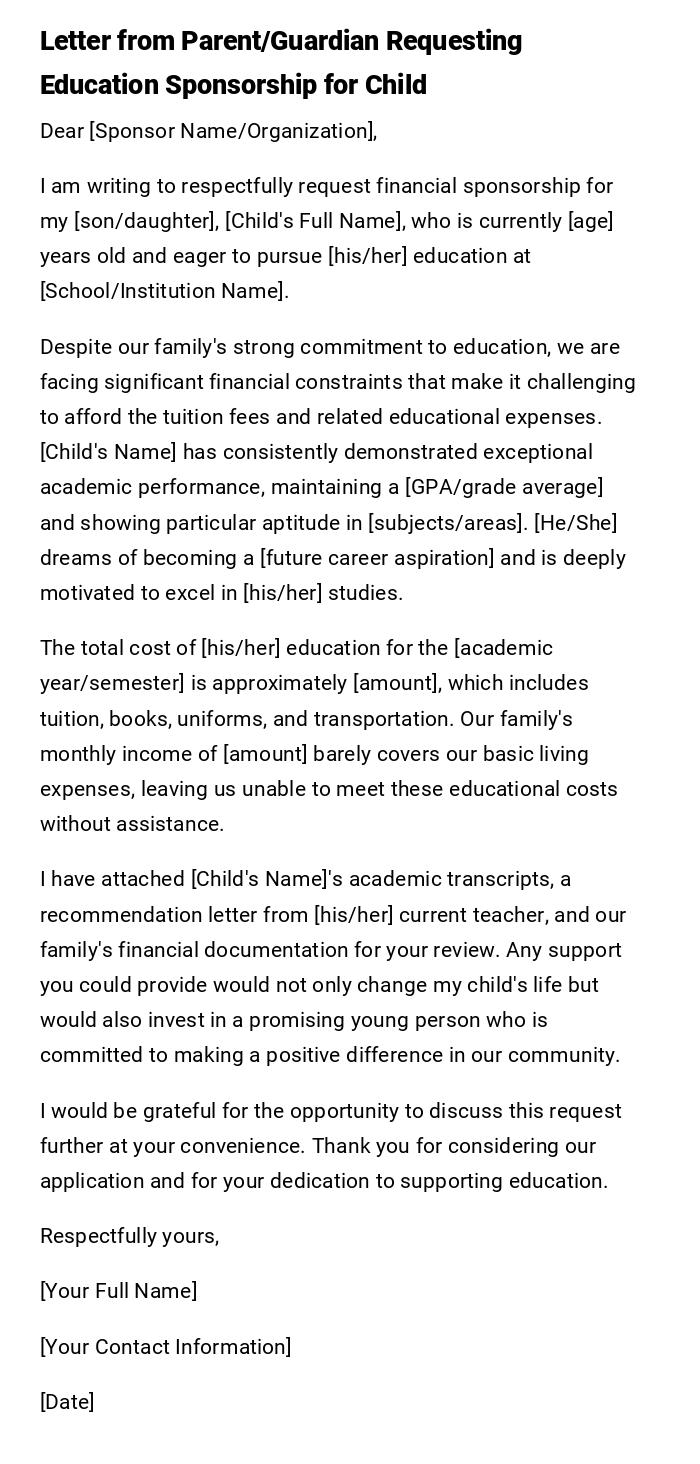
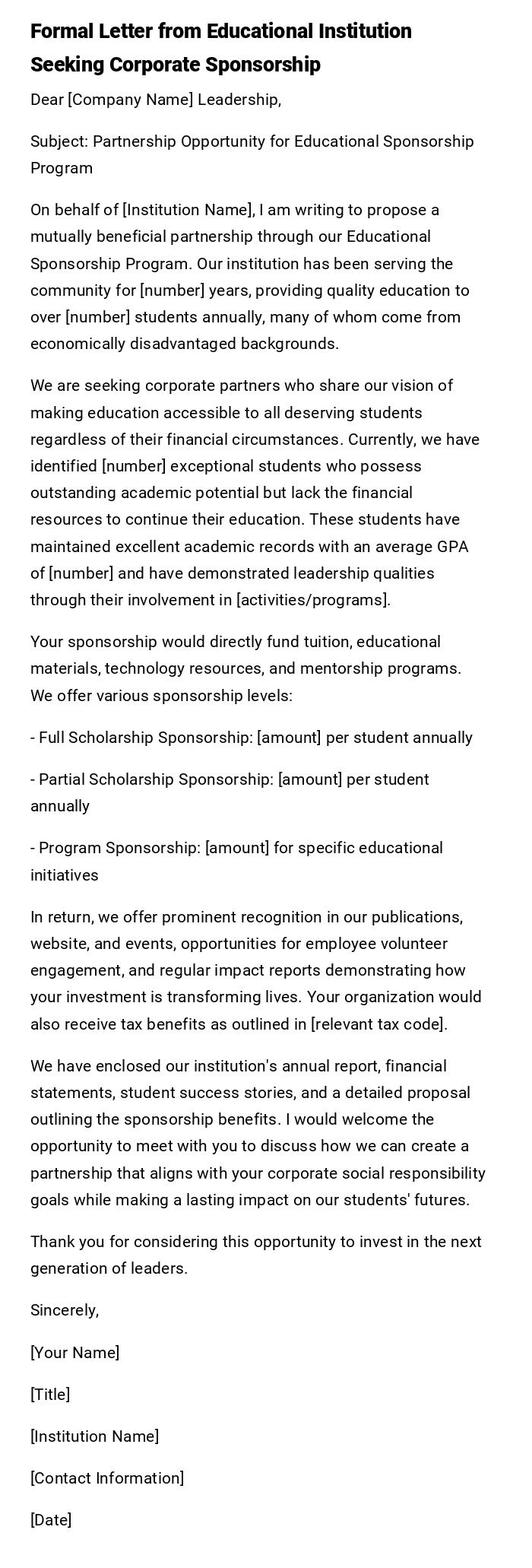
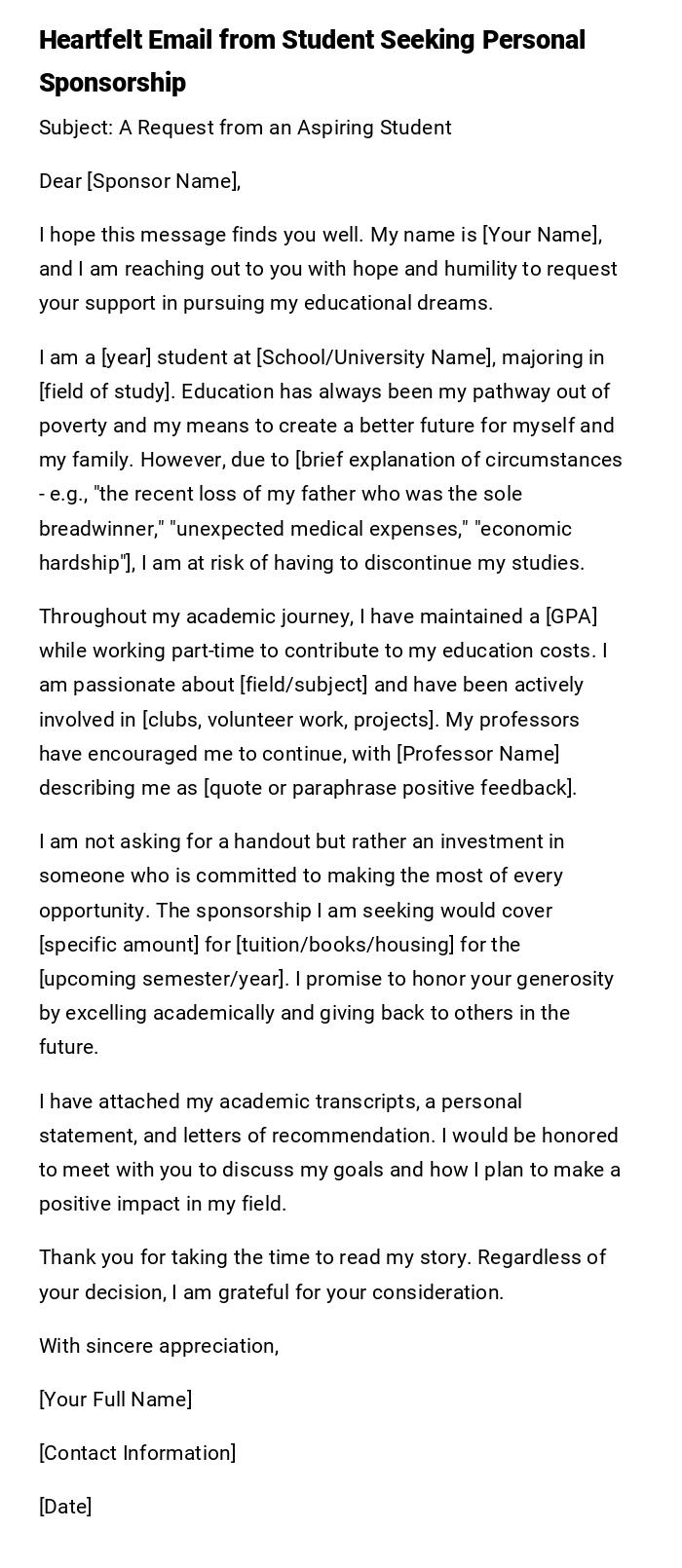

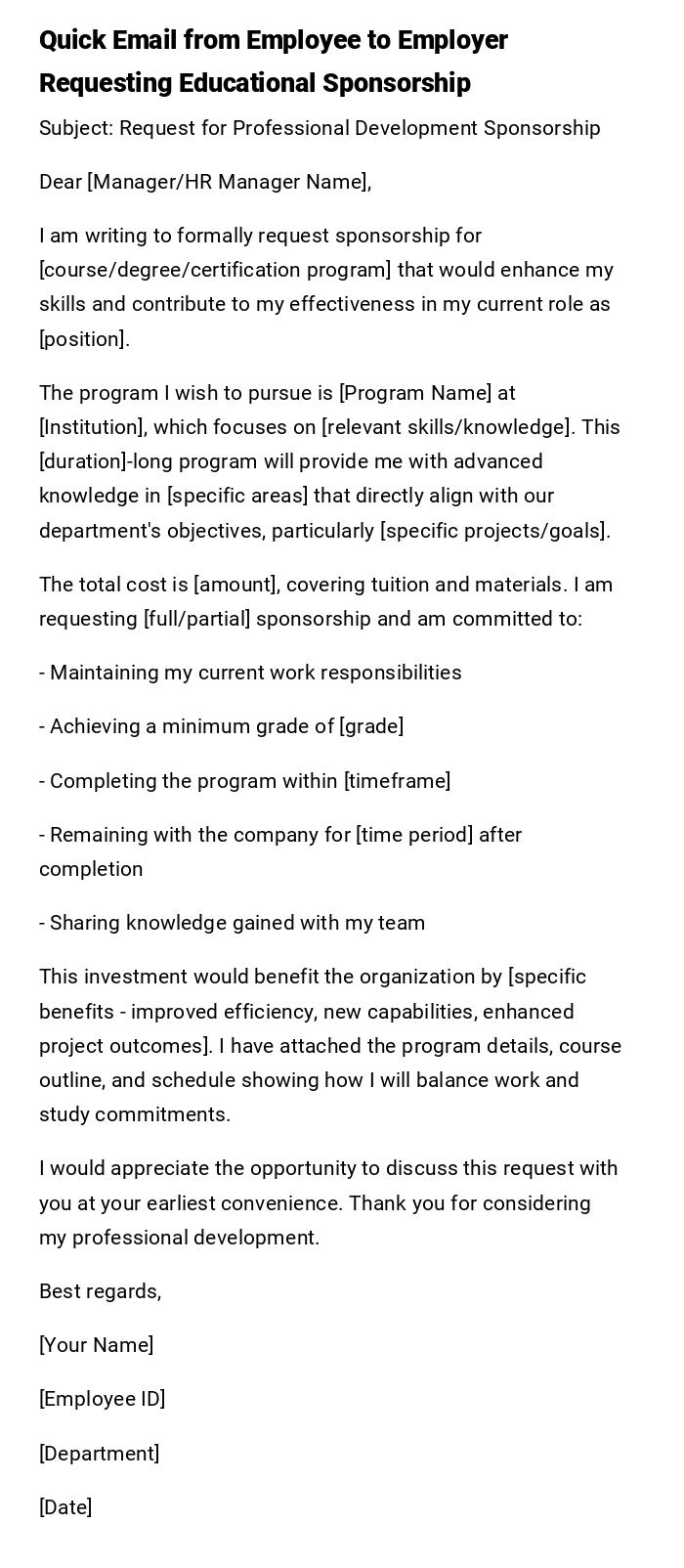
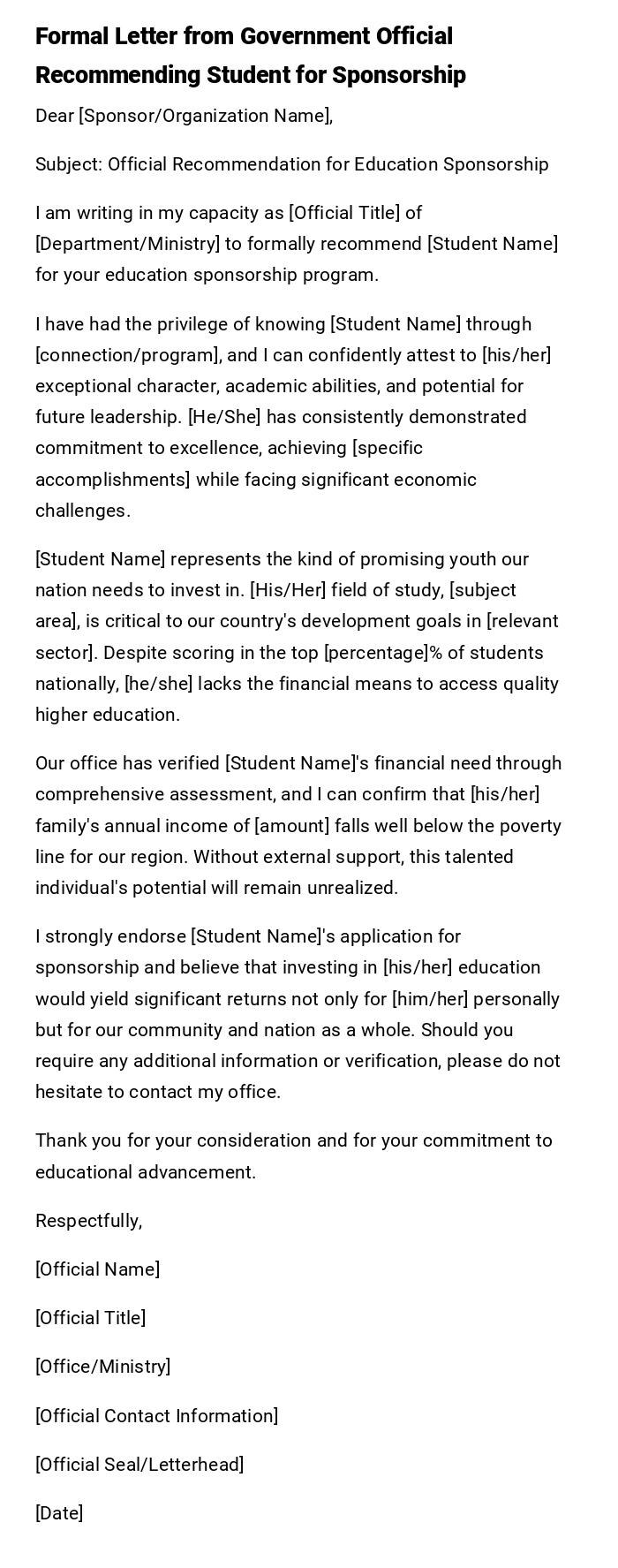
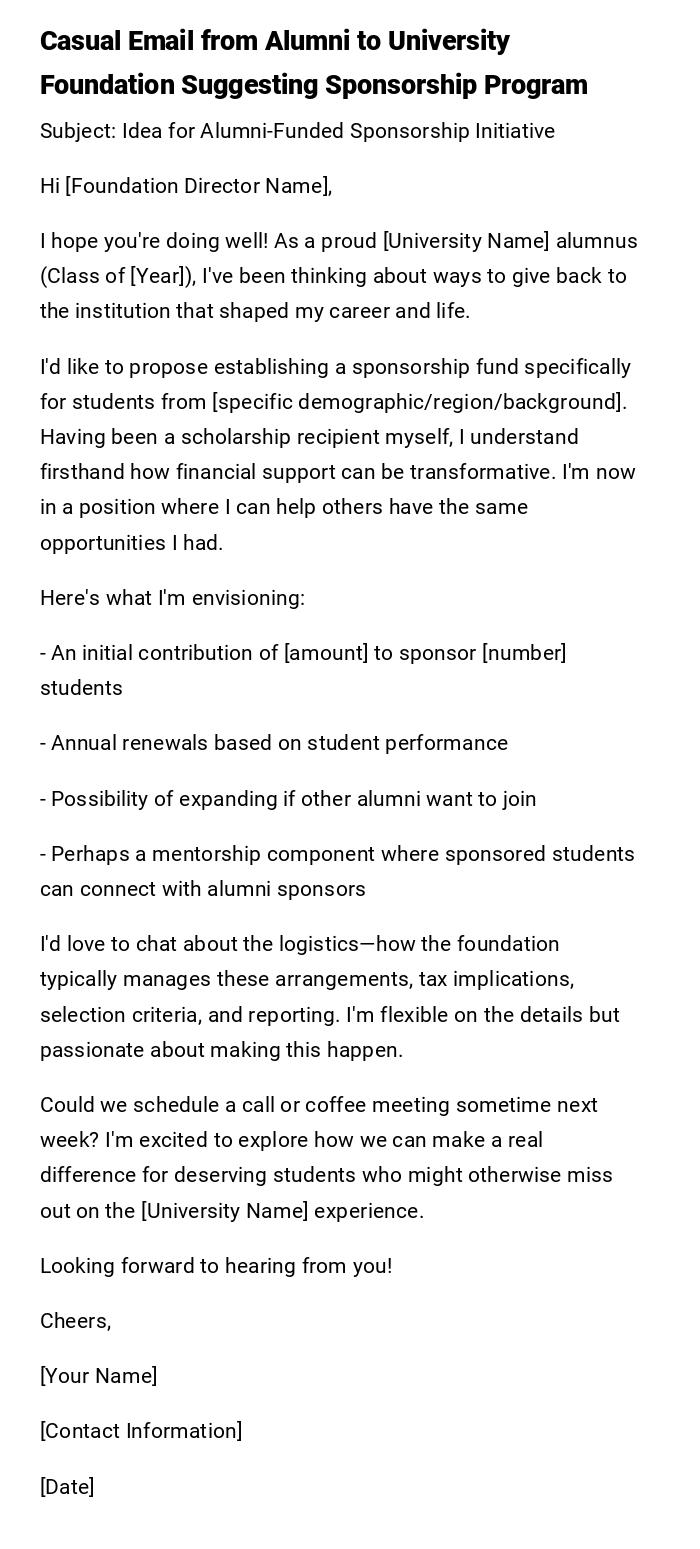
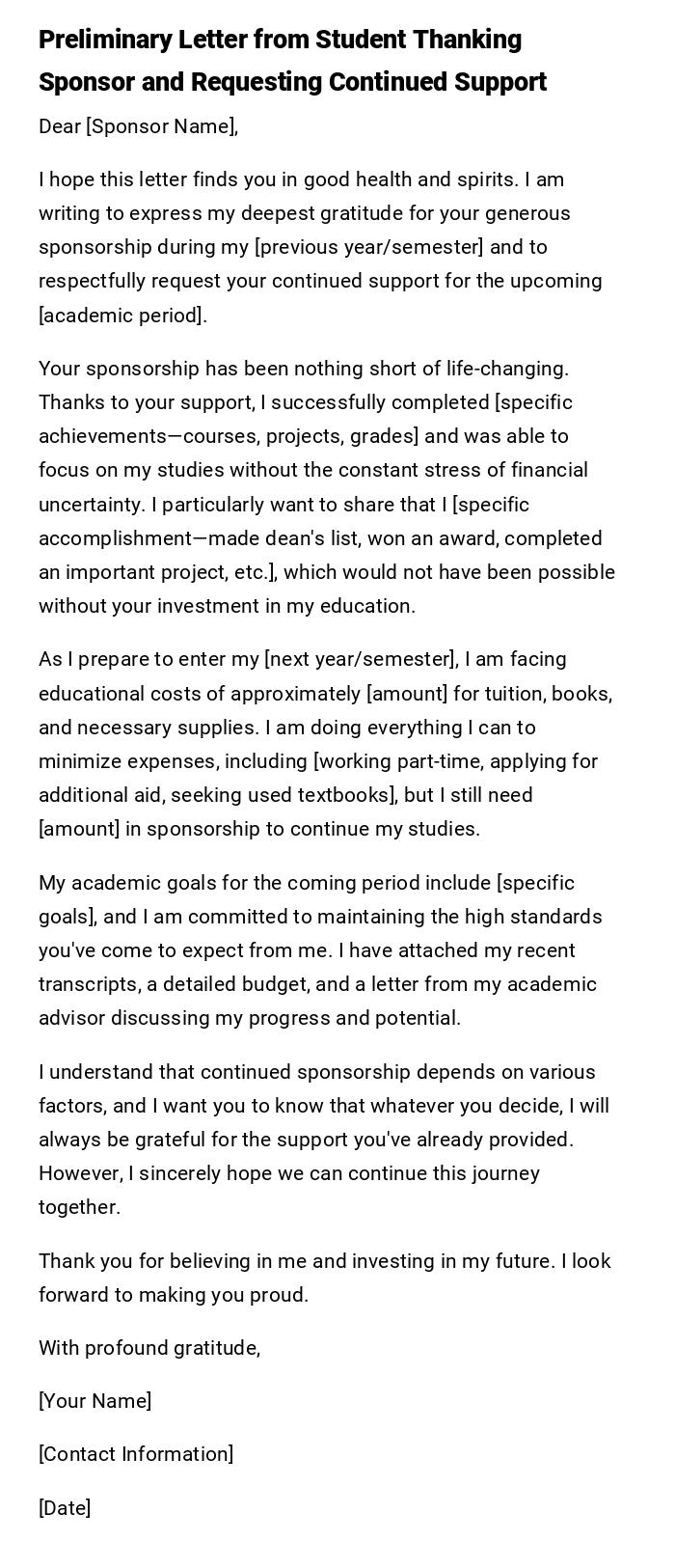

 Download Word Doc
Download Word Doc
 Download PDF
Download PDF